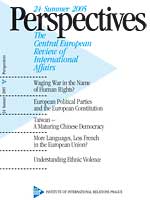More Languages, Less French? The Enlarged EU and the Status of French as an EU language
More Languages, Less French? The Enlarged EU and the Status of French as an EU language
Author(s): Bořivoj HnízdoSubject(s): Politics / Political Sciences
Published by: Ústav mezinárodních vztahů
Keywords: European integration; Central and Eastern Europe; enlargement; languages of wider communication; language policy; French language
Summary/Abstract: From an historical perspective of European integration, the French language has been particularly privileged. However, one of the most visible results of the last ten years of integration is that French has lost its dominance in the EU. This article analyses the role played by enlargement in the changing position of French. From the perspective of languages of wider communication (LWC) in the EU, the 2004 enlargement saw the EU sharply divided between the big language speakers, mostly in the West, and the small language speakers in the North and East. West-Europeans mostly use their native languages as languages of wider communication, but in the Northern and Eastern parts it is natural to use a language other than the mother tongue. This division poses a challenge to French in particular. In contrast to English and German, while French is seen as a big language (particularly in Northern and Central Europe), it is not seen as a practical LWC.
Journal: Perspectives : Review of International Affairs
- Issue Year: 2005
- Issue No: 24
- Page Range: 61-68
- Page Count: 8
- Language: English

